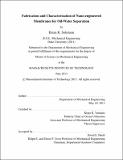Fabrication and characterization of nano-engineered membranes for oil-water separation
Author(s)
Solomon, Brian R. (Brian Richmond)
DownloadFull printable version (4.649Mb)
Other Contributors
Massachusetts Institute of Technology. Department of Mechanical Engineering.
Advisor
Kripa K. Varanasi.
Terms of use
Metadata
Show full item recordAbstract
The focus of this thesis is the design and testing of membranes for separation of water-in- oil (w/o) emulsions. A polycarbonate membrane treated with octadecyltrichlorosilane (OTS) is used to filter a 3 wt% w/o emulsion. The permeate is characterized to have no measurable water content by microscopy, dynamic light scattering (DLS) and differential scanning calorimetry (DSC). To extend this work, a method for fabricating an asymmetric polysulfone membranes is presented. The polysulfone membrane has the feature of allowing much higher flow rates for a given applied pressure. The research is largely motivated by a need for low cost methods for separating o/w and w/o emulsions. The largest source of wastewater is generated by the petroleum industry as o/w emulsions. Currently, industry has a number of methods for cleaning produced water. The inherent problem is that the smaller dispersed droplets are the more expensive they are to separate. In addition, the fundamental equations and models that govern interfacial phenomena and hydrophobic/oleophilic membranes are developed. In all, this work present a method for successfully separating oil droplets smaller than a micron from water by a novel methodology.
Description
Thesis: S.M., Massachusetts Institute of Technology, Department of Mechanical Engineering, 2013. Cataloged from PDF version of thesis. Includes bibliographical references (pages 55-58).
Date issued
2013Department
Massachusetts Institute of Technology. Department of Mechanical EngineeringPublisher
Massachusetts Institute of Technology
Keywords
Mechanical Engineering.